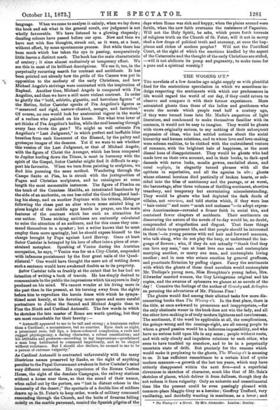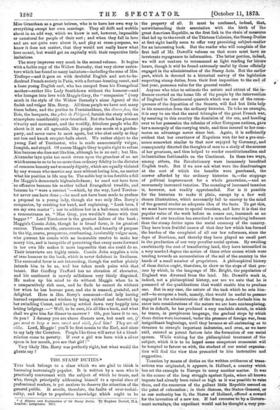THE WOOING O'T.* TIM novelists of a few decades ago
might supply us with plentiful food for the sententious speculation in which we sometimes in- dulge respecting the sentiments with which our predecessors in life would regard the world of our day, if they could return to observe and compare it with their former experiences. More astonished ghosts than those of the ladies and gentlemen who wrote the novels which people read half a century ago, if they were turned loose into Mr. Mudie's emporium of light literature, and condemned to make themselves familiar with its contents, it would not be easy to imagine. They would be ghosts with views originally serious, to say nothing of their subsequent expansion of ideas, who had settled notions about the social hierarchy and human relations, and to whom love and love-making were solemn realities, to be clothed with the embroidered vesture of romance, with the brightest halo of happiness, or the most dismal hues of disappointment. They would be ghosts who had made love on their own account, and in their books, to dark-eyed damsels with raven locks, muslin gowns, sandalled shoes, and coral negliges, in elegantly turned phrases with all the epithets in superlative, and all the agonies in alto ; ghosts whose ethereal heroines died poetically of broken hearts, or sub- sided into the bliss of matrimony and the peerage, or at worst, the baronetage, after three volumes of thrilling sentiment, abortive treachery, and temporary but excruciating misunderstanding. They would be ghosts who had depicted the dark deeds of villains, not vauriens, and told stories which, if they were less " hair-raisin' " and more " mush and molasses "—to adopt expres- sive Americanisms—revealed a firmer faith in social ties, and contained fewer chapters of accidents. Their sentiments on discovering the nature of the novels of to-day would be, no doubt, compounded of stupefaction and disgust. That these things should claim to represent life, and that people should be interested in them !—in young persons with red hair and forward manners, who talk slang, who do not play the harp, or understand the lan- guage of flowers ; who, if they do not actually " thank God they can love any man," can at least love one man and contemplate marrying another, or marry one man, and contemplate loving another ; and in men who evince emotion by general gruffness, and punctuate flirtation by puffing cigars. Fancy the sentiments with which the ghosts of those dead novelists would contemplate Mr. Trollope's young men, Miss Broughton's young ladies, Mrs. Edwardes' married women, the Guy Livingstone original and his copies, and the swarms of ephemera we glance at as novels of the day ! Conceive the feelings of the author of Granby and Arlington on perusing the adventures of Mr. Phineas Finn !
The ghosts would find among their allotted tasks few more dis- concerting books than The lVooing o't. In the first place, there is
the title, at once awkward to pronounce and inappropriate,—for the only obstinate wooer in the book does not win the lady, and all the other love-making is of truly modern lightness and carelessness.
The sentiment, if the word be applicable at all, the complications,
the goings-wrong and the comings-right, are all among people to whom a grand passion would be a ludicrous impossibility, and who
have no serious hold upon life in any sense ; people without roots, and with only cloudy and impulsive relations to each other, who seem to have tumbled up somehow, and to be in a perpetually uncertain state of drift. But precisely for the reasons which would make it perplexing to the ghosts, The Wooing o't is amusing to us. It has sufficient resemblance to a certain kind of quite modern manners—a growth of the last ten years, which may have uttterly disappeared within the next five—and a superficial cleverness in sketches of character, much like that of Mr. Sala's sketches of places, which deliver it from dullness, though they do not redeem it from vulgarity. Only an unheroic and unsentimental time like the present could be even passingly pleased with
common-place Maggie Grey as a heroine ; Geoffrey Trafford, very vacillating, and decidedly wanting in manliness, as a lover ; and • The Wooing o't• a Novel. By Mrs. Alexander. London Bentley.
Miss Grantham as a great heiress, who is to have her own way in everything except her own marriage. They all drift and wobble about in an odd way, which we know is not, however, impossible or unnatural for people of their sort ; and when they fall in love and are not quite sure about it, and play at cross-purposes, we know it does not matter, that they would not really know what love meant, but would get on capitally with their respective little imitations.
The story improves very much in the second volume. It begins with a feeble copy of the Widow Barnaby, that very clever carica- ture which has found ao many imitators—including the sons of Mrs. Trollope—and it goes on with doubtful English and not-to-be- -doubted French society in Paris, with a fortune-hunting count, and a loose young English earl, who has escaped from his Evangelical mother—rather like Lady Southdown without the humour—and who lounges into love with Maggie Grey, the " companion " (very much in the style of the Widow Barnaby's niece Agnes) of the foolsh and vulgar Mrs. Berry. All these people we have met many times before, and the parties to Fontainebleau, the diners fins, the Bois, the bouquets, theptfte's de Perigord, furnish the story with an atmosphere considerably over-breathed. But the book has pleasant vivacity and movement, and the worldly, frivolous people who flit about in it are all agreeable, like people one meets at a garden- party, and never cares to meet again, but who chat easily as they eat ices and knock croquet-balls about. We rather object to the ,young Earl of Torchester, who is made unnecessarily vulgar, lumpish, and stupid. Of course Maggie Grey is quite right to refuse him because she does not like him, although he is an earl ; but Mrs. Alexander lays quite too much stress upon the grandeur of an act which seems to us to be no more than ordinary fidelity to the dictates of common honesty and womanlydignity, which are equally violated by any woman who marries any man without loving him, no matter what his position in life may be. The noble boy is too forcible a foil for Maggie's democratic highmindedness ; he need not have been so offensive because his m other talked Evangelical Waddle, and because he " wore a coronet "—which, by the way, Lord Torches- ter never can have done ;—he need not have been made to preface a proposal to a young lady, though she was only Mrs. Berry's companion, by catching her hand, and explaining, Look here, I am my own master " ; nor to address her in a ball-room with such a remonstrance as, " Miss Grey, you wouldn't dance with that beggar ?" Lord Torchester is the greatest failure of the book ; Maggie's Cousin John, though he is broad farce, is its greatest success. There are life, earnestness, truth, and tenacity of purpose in the big, coarse, prosperous, overbearing, intolerably vulgar man, who pursues his cousin with an inexorable resolve to make her marry him, and is incapable of perceiving that every move forward in her own life makes it more impossible that she could do so. Their interviews are highly comic. Cousin John supplies a vein of true humour to the book, which is never deficient in liveliness. The successful lover is not interesting, though the author plainly intends him to be so, and has taken much pains with that intent. But Geoffrey Trafford has no elevation of character, and his sentiment is merely selfishness very thinly disguised. He makes up his mind to do without Maggie when he is a comparatively rich man, and he finds he cannot do without her when he has become poor, and she is amazed, grateful, and delighted. Here is Mrs. Berry's comment—that lady having learned experience and wisdom by being robbed and deserted by her swindling Count, and having settled down very happily into letting lodgings :—" Well, to be sure, it's all like a book, and what shall we give him for diaper to-morrow? Oh, you leave it to me, do you ? I daresay you are above dinners now, but mark me, if you want to keep a man sweet and civil, feed him They are all alike. Lord, Maggie ! you'll be first cousin to the Earl, and niece to my lady the Countess. People like them will never let a blood- relation come to poverty. If ever a girl was born with a silver spoon in her mouth, you are that girl !"
Very likely Mrs. Berry was perfectly right, but what would the ghosts say ?



































 Previous page
Previous page